Excavation Contractors Huron
Best Trenching Services in Huron
Receive 3 FREE Excavating Contractors quotes for your project today! Compare profiles, reviews, accreditations, portfolio, etc... and choose the best offer.
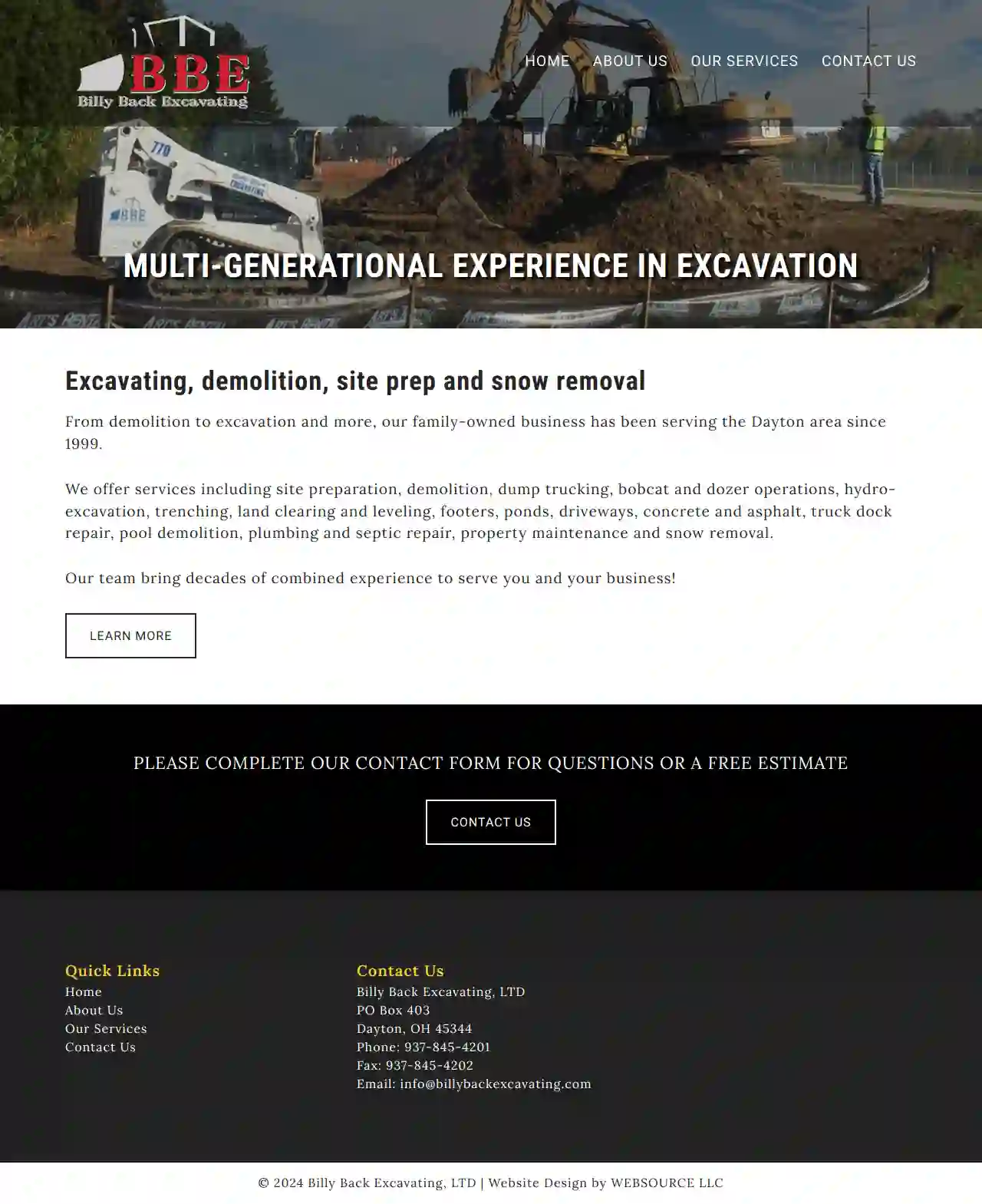
Billy Back Excavating LTD
3.33 reviewsPO Box 403, Dayton, 45344, USMulti-Generational Experience in Excavation Billy Back Excavating has been serving the Dayton area since 1999, offering a wide range of services for both residential and commercial clients. Our family-owned business is committed to providing high-quality workmanship and exceptional customer service. We take pride in our multi-generational experience and dedication to exceeding expectations. From demolition to excavation and more, we have the expertise and equipment to handle any project, big or small. Our team brings decades of combined experience to serve you and your business! We are committed to providing our clients with the highest level of service and satisfaction. We offer free estimates and are always available to answer your questions.
- Services
- Why Us?
- Gallery
Get Quote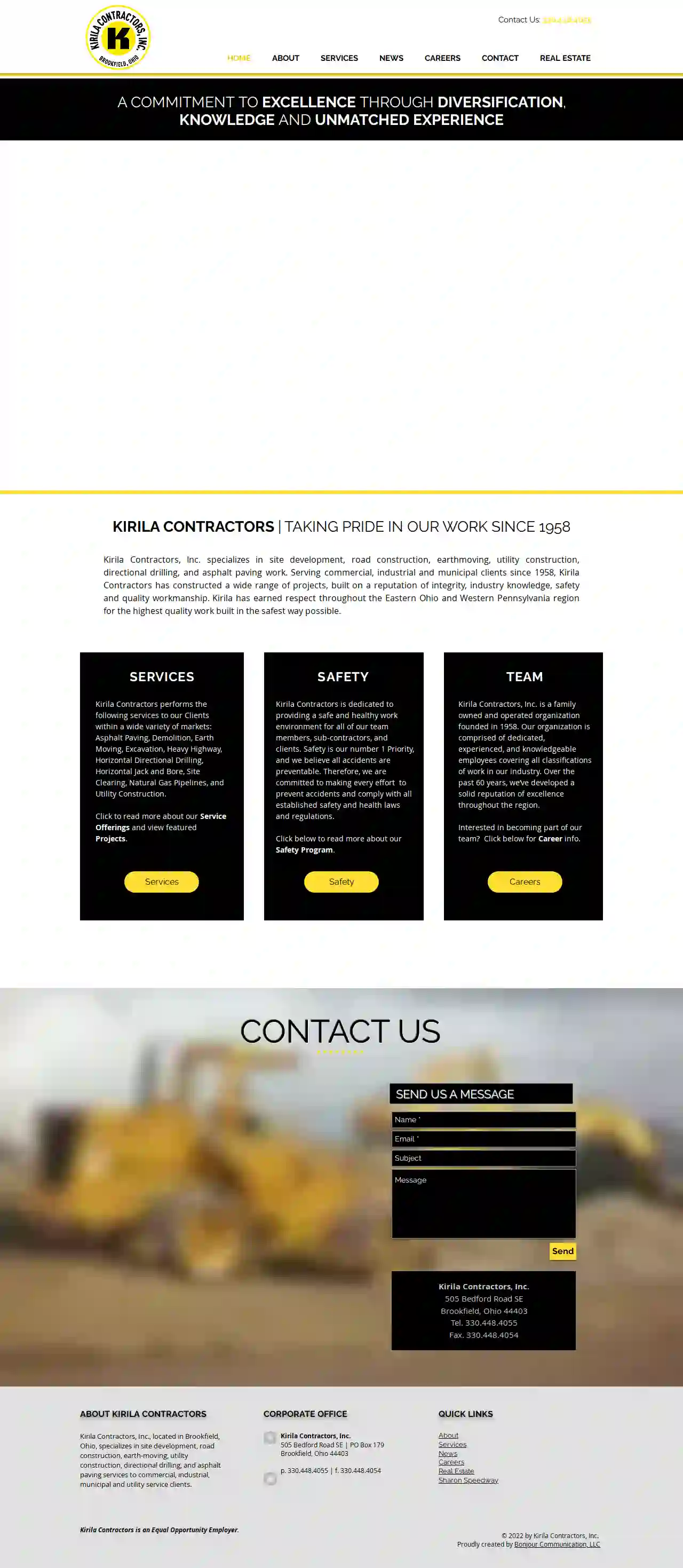
Kirila Contractors Inc
4.19 reviews505 Bedford Road SE, Brookfield, 44403, USA COMMITMENT TO EXCELLENCE THROUGH DIVERSIFICATION, KNOWLEDGE AND UNMATCHED EXPERIENCE KIRILA CONTRACTORS | TAKING PRIDE IN OUR WORK SINCE 1958 Kirila Contractors, Inc. specializes in site development, road construction, earthmoving, utility construction, directional drilling, and asphalt paving work. Serving commercial, industrial and municipal clients since 1958, Kirila Contractors has constructed a wide range of projects, built on a reputation of integrity, industry knowledge, safety and quality workmanship. Kirila has earned respect throughout the Eastern Ohio and Western Pennsylvania region for the highest quality work built in the safest way possible.
- Services
- Why Us?
- Gallery
Get Quote
Ady Excavating
3.73 reviewsYoungstown, USBuilt on Quality and Dedication Ady Excavating offers a wide variety of services to Industrial, Commercial, Residential, and Municipal customers. Our team is dedicated to providing high-quality workmanship and exceptional customer service. We are committed to safety and environmental responsibility on every project. We have a proven track record of success in the culvert industry, with thousands of feet of Paved invert repairs and slip lining under our belt. We are the perfect choice to take care of any failing culvert. We utilize the Mr. Manhole method to bring all of your adjustment needs to today's ODOT standards. Whether it's a large project or a small repair, we have you covered. With all of our company's past experience and success in the culvert industry, we now offer culvert inspections and consultations. Contact us today to get your inspection scheduled.
- Services
- Why Us?
- Gallery
Get Quote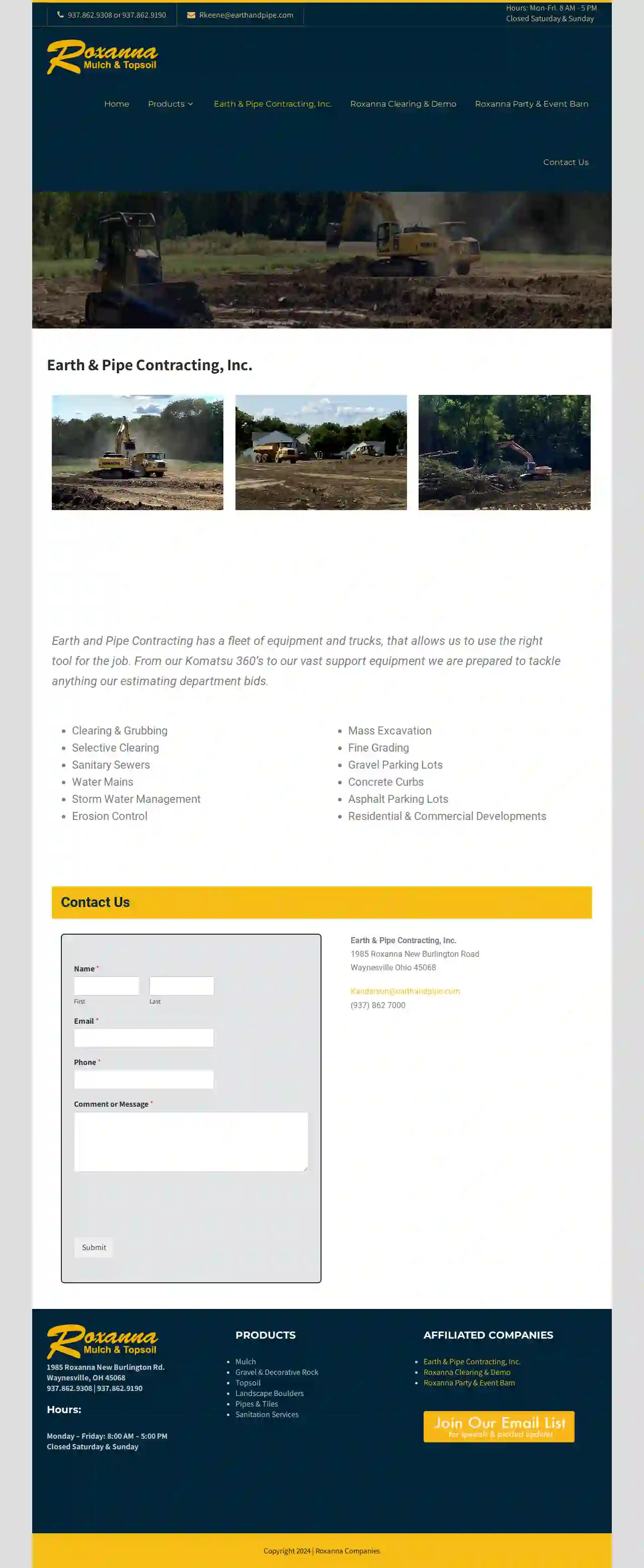
Earth & Pipe Contracting Inc
57 reviews1985 Roxanna New Burlington Road, Waynesville, 45068, USEarth & Pipe Contracting, Inc. Earth and Pipe Contracting has a fleet of equipment and trucks, that allows us to use the right tool for the job. From our Komatsu 360’s to our vast support equipment we are prepared to tackle anything our estimating department bids. Services Offered Clearing & Grubbing Selective Clearing Sanitary Sewers Water Mains Storm Water Management Erosion Control Mass Excavation Fine Grading Gravel Parking Lots Concrete Curbs Asphalt Parking Lots Residential & Commercial Developments
- Services
- Why Us?
- Gallery
Get Quote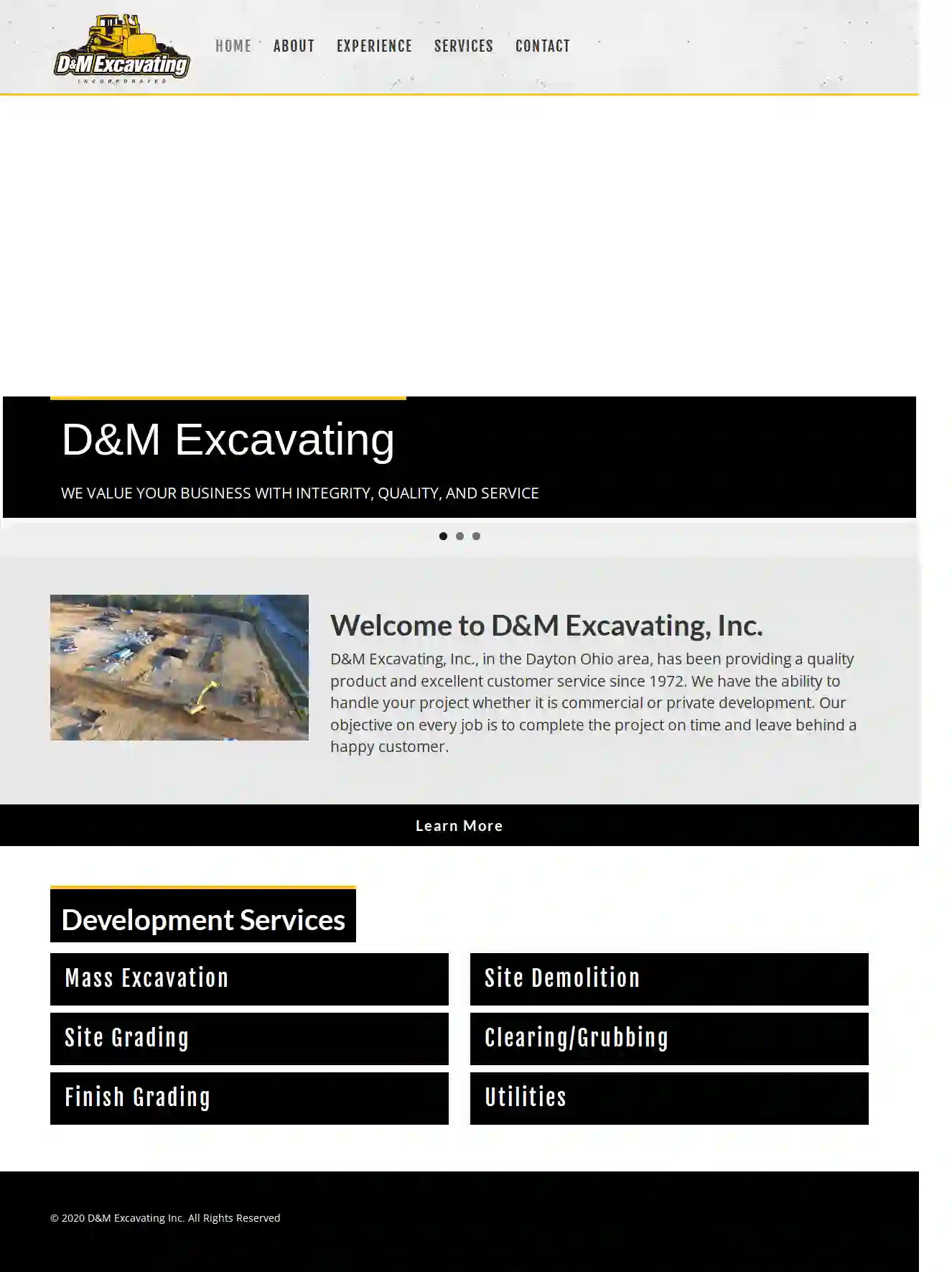
D & M Excavating Inc
4.47 reviews9465 State Route 202, Tipp City, 45371, USAbout D&M Excavating, Inc. D&M Excavating, Inc., serving the Dayton Ohio area, has been providing quality products and excellent customer service since 1972. We have the expertise to handle your project, whether it's commercial or private development. Our commitment on every job is to complete the project on time and leave behind a happy customer. D&M Excavating, Inc. has been in business for over 40 years. During this time, we have worked primarily in the Miami Valley on a large variety of projects for many customers while maintaining relationships with several repeat customers. We are large enough to handle most any project but remain small enough that our owners get to each job daily to check on progress and resolve any problems that may arise. We recognize that leaving the job with a satisfied client is the only way to remain in business. Our many repeat customers are proof of the good impression we leave after every job.
- Services
- Why Us?
- Gallery
Get Quote
Viox Excavating Inc
4.415 reviews5119 E. US HWY 22-3, Morrow, 45152, USAbout Us Viox Excavating is a family owned and operated company, so we take pride in our work and always keep our customers' best interest in mind. We are determined to provide quality, honest and reliable service. Our Scope of work We offer a wide range of services, including: Residential and Commercial Excavating Septic Installation and Alteration Hauled Water Storage Systems Underground Utilities Demolition Gravel Construction Driveways Finished Gravel Driveways Lot Clearing and Mulching We are licensed, bonded and insured with the State of Ohio and currently service Butler, Clermont, Clinton, Greene and Warren Counties. Our Commitment to Quality "I started excavating with my father over 40 years ago in Warren and surrounding counties. This has always been my home so I care about the people. That is why my company does its best to perform all our work the same way I would want it done at my own home. That's the way my dad did it and I am blessed with more employees and better equipment to get the job done today." - Jerry Viox, Owner
- Services
- Why Us?
- Our Team
- Testimonials
- Gallery
Get Quote
Dayton Ditch & Drainage
4.962 reviewsDayton, USDayton Ditch & Drainage: Your Trusted Drainage Experts in the Greater Dayton Area Dayton Ditch & Drainage is a locally owned and operated company dedicated to providing exceptional drainage solutions for both residential and commercial properties in the Greater Dayton Metropolitan Area. Our team of experienced professionals has been serving the Miami County area for years, building a reputation for quality workmanship, affordability, and customer satisfaction. We understand the frustration and inconvenience that water damage can cause. Whether you're dealing with basement flooding, landscaping erosion, or persistent water pooling, we have the expertise and resources to address your drainage needs effectively. Our founder, Brian Lambert, brings over three decades of experience in the commercial drainage installation industry. This wealth of knowledge allows us to provide tailored solutions that meet your specific requirements and budget. At Dayton Ditch & Drainage, we are committed to: • Providing comprehensive drainage assessments to identify the root cause of your issues. • Offering a wide range of drainage solutions, including French drains, sump pumps, catch basins, and more. • Utilizing high-quality materials and proven installation techniques to ensure lasting results. • Delivering prompt and professional service, keeping you informed throughout the entire process. • Offering competitive pricing and flexible financing options to make our services accessible to all. We are proud to be a trusted partner for homeowners and businesses in the Dayton area. Our commitment to excellence has earned us numerous positive testimonials from satisfied clients. We invite you to explore our website and learn more about our services. Contact us today for a free consultation and let us help you reclaim your property from the damaging effects of water.
- Services
- Why Us?
- Testimonials
- Gallery
Get Quote
Ferguson Construction
4.110 reviewsP.O. Box 726400, 400 Canal Street, Sidney, 45365, USBUILDING IS COMPLICATED. YOU DESERVE AN EASY BUTTON. We know the challenges and complications of commercial construction. We anticipate them and even embrace them. Our “easy button” approach simplifies the entire process while reducing uncertainty and miscommunication, giving businesses the positive experience they deserve. EXPLORE OUR EASY BUTTON ON APPROACH
- Services
- Why Us?
- Accreditations
- Testimonials
- Gallery
Get Quote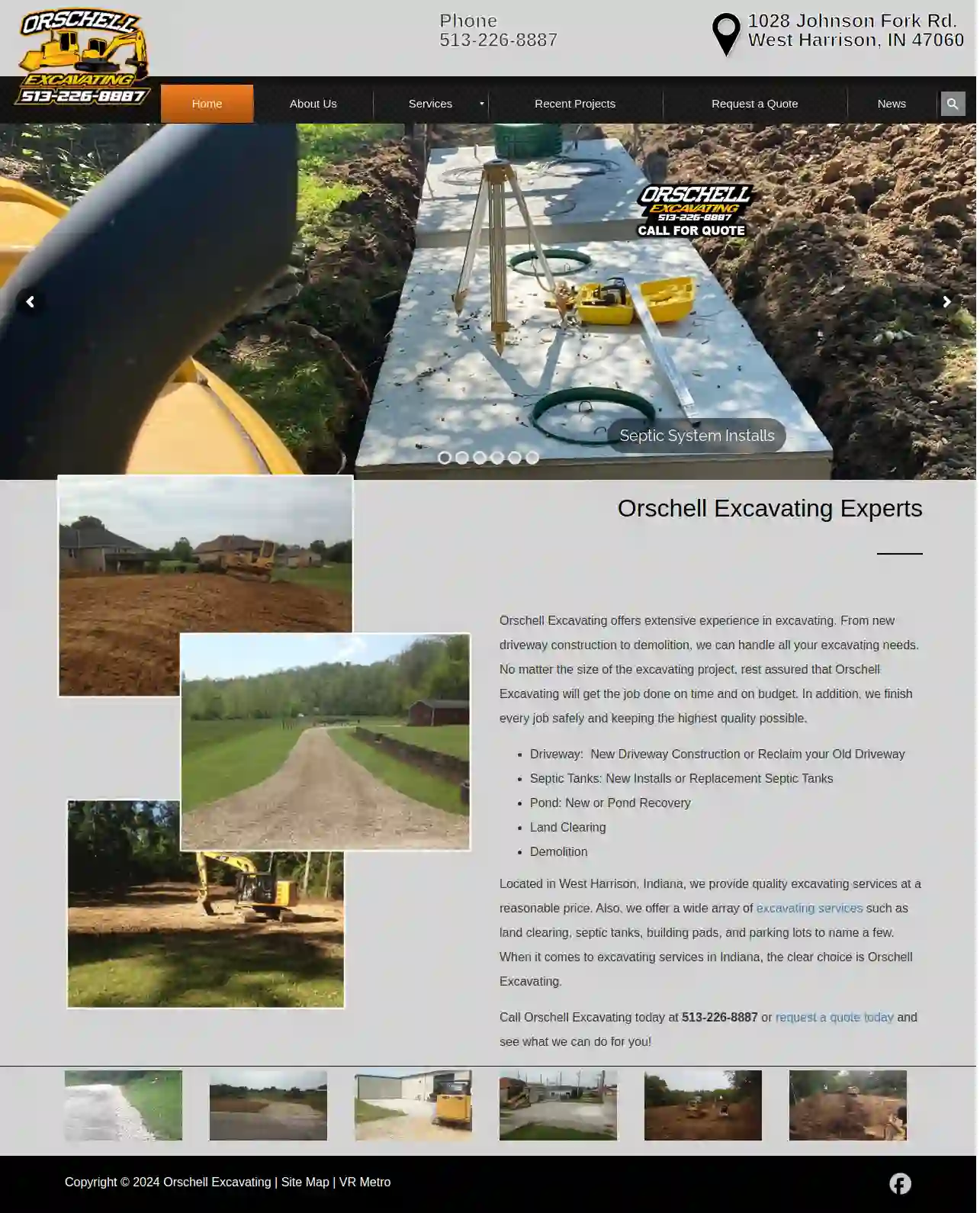
Orschell Excavating
522 reviews1028 Johnson Fork Rd., West Harrison, 47060, USOrschell Excavating Experts Orschell Excavating offers extensive experience in excavating. From new driveway construction to demolition, we can handle all your excavating needs. No matter the size of the excavating project, rest assured that Orschell Excavating will get the job done on time and on budget. In addition, we finish every job safely and keeping the highest quality possible. Services Offered Driveway: New Driveway Construction or Reclaim your Old Driveway Septic Tanks: New Installs or Replacement Septic Tanks Pond: New or Pond Recovery Land Clearing Demolition Located in West Harrison, Indiana, we provide quality excavating services at a reasonable price. Also, we offer a wide array of excavating services such as land clearing, septic tanks, building pads, and parking lots to name a few. When it comes to excavating services in Indiana, the clear choice is Orschell Excavating.
- Services
- Why Us?
- Gallery
Get Quote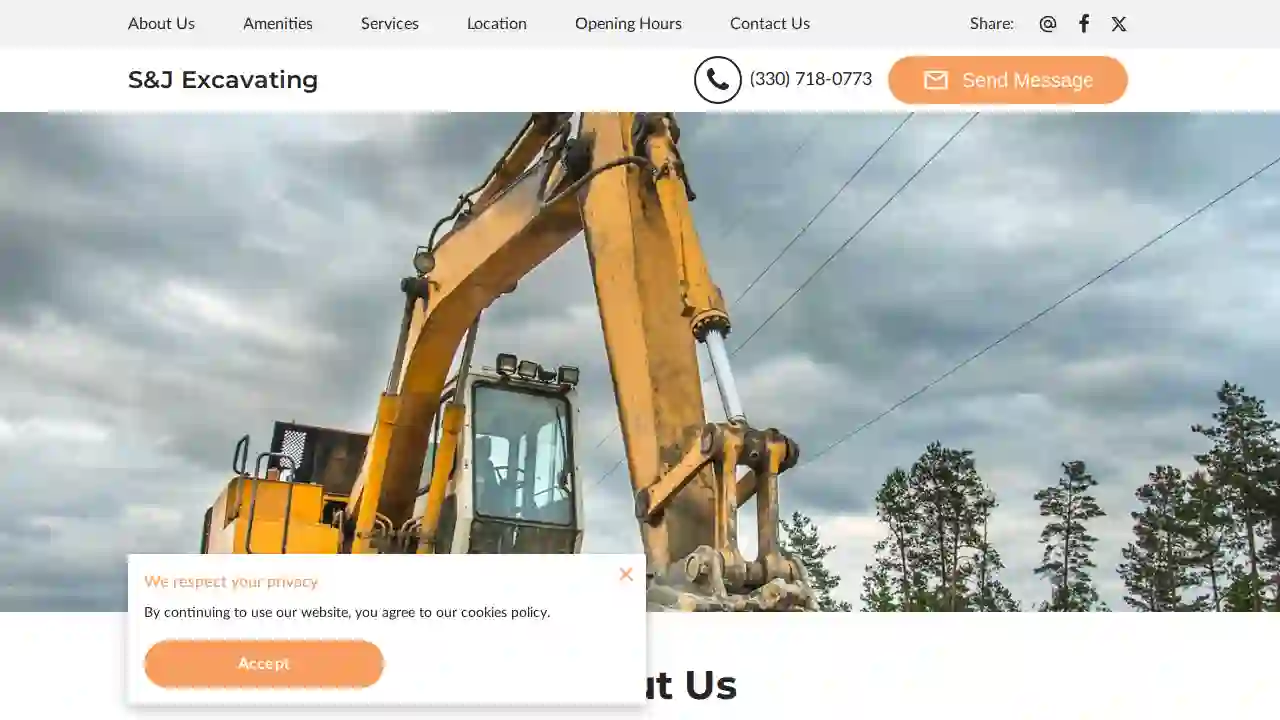
S&J Excavating
Youngstown, Ohio, 44510, USAbout Us Here at S&J Excavating we deliver a selection of professional excavation services based in the area. Our experienced excavators do more than just dig holes and transport dirt, our services include a plethora of skills from preparing your building site for foundation laying, digging trenches, as well as creating drainage routes across building developments. Of course, we still also dig holes and transport dirt. So if you’re interested in our excavation services give us a message on the form below to find out more, or call us at +12348557653 .
- Services
- Why Us?
Get Quote
Over 22,076+ Excavation Pros in our network
Our excavation providers operate in Huron and beyond!
ExcavationHQ has curated and vetted Top Excavation Pros near Huron. Find a trustworthy contractor today.
Frequently Asked Questions About Excavation Contractors
- New Construction: Laying foundations, basements, or underground utilities for new buildings.
- Home Additions: Creating space for new rooms, basements, or extensions.
- Landscaping: Leveling ground, creating slopes, installing retaining walls, or digging for ponds or pools.
- Drainage Improvement: Installing French drains, drainage ditches, or swales to manage water runoff.
- Utility Installation or Repair: Laying new water, sewer, gas, or electrical lines, or repairing existing ones.
- Demolition: Clearing debris and preparing the site after demolishing a structure.
- Determining Soil Suitability: Assessing whether the soil can support the intended structure or load.
- Recommending Foundation Types: Advising on the appropriate foundation design based on soil characteristics.
- Addressing Drainage and Erosion Issues: Providing solutions to manage water runoff and prevent erosion.
- Evaluating Slope Stability: Assessing the risk of landslides or soil movement on slopes.
- Building on challenging soil types (expansive clay, loose sand, etc.)
- Constructing large or complex structures
- Excavating near slopes or retaining walls
- Addressing drainage or erosion concerns
- Sloped Property: Your property has a significant slope, making it prone to soil erosion or landslides.
- Creating Usable Space: You want to level off a sloped area to create a flat surface for patios, gardens, or other outdoor spaces.
- Preventing Damage: Erosion is threatening existing structures, driveways, or walkways.
- Landscaping Features: You're incorporating tiered gardens, raised beds, or other landscaping elements requiring soil retention.
- Utility Locates: Contact your utility companies to mark the locations of underground lines before excavation begins. This is usually a free service.
- Hand Digging: Excavate carefully by hand near marked utility lines to avoid damage.
- Potholing: Digging small test holes to expose and verify utility depths and locations.
- Safe Distances: Maintaining a safe distance between excavation equipment and marked utility lines.
- Vacuum Excavation: Using vacuum excavation techniques to expose utilities without digging, reducing the risk of damage.
How do I know if I need excavation for my project?
What is a soil engineer, and do I need one?
How do I know if I need a retaining wall?
How do you protect utilities during excavation?
How do I know if I need excavation for my project?
- New Construction: Laying foundations, basements, or underground utilities for new buildings.
- Home Additions: Creating space for new rooms, basements, or extensions.
- Landscaping: Leveling ground, creating slopes, installing retaining walls, or digging for ponds or pools.
- Drainage Improvement: Installing French drains, drainage ditches, or swales to manage water runoff.
- Utility Installation or Repair: Laying new water, sewer, gas, or electrical lines, or repairing existing ones.
- Demolition: Clearing debris and preparing the site after demolishing a structure.
What is a soil engineer, and do I need one?
- Determining Soil Suitability: Assessing whether the soil can support the intended structure or load.
- Recommending Foundation Types: Advising on the appropriate foundation design based on soil characteristics.
- Addressing Drainage and Erosion Issues: Providing solutions to manage water runoff and prevent erosion.
- Evaluating Slope Stability: Assessing the risk of landslides or soil movement on slopes.
- Building on challenging soil types (expansive clay, loose sand, etc.)
- Constructing large or complex structures
- Excavating near slopes or retaining walls
- Addressing drainage or erosion concerns
How do I know if I need a retaining wall?
- Sloped Property: Your property has a significant slope, making it prone to soil erosion or landslides.
- Creating Usable Space: You want to level off a sloped area to create a flat surface for patios, gardens, or other outdoor spaces.
- Preventing Damage: Erosion is threatening existing structures, driveways, or walkways.
- Landscaping Features: You're incorporating tiered gardens, raised beds, or other landscaping elements requiring soil retention.
How do you protect utilities during excavation?
- Utility Locates: Contact your utility companies to mark the locations of underground lines before excavation begins. This is usually a free service.
- Hand Digging: Excavate carefully by hand near marked utility lines to avoid damage.
- Potholing: Digging small test holes to expose and verify utility depths and locations.
- Safe Distances: Maintaining a safe distance between excavation equipment and marked utility lines.
- Vacuum Excavation: Using vacuum excavation techniques to expose utilities without digging, reducing the risk of damage.